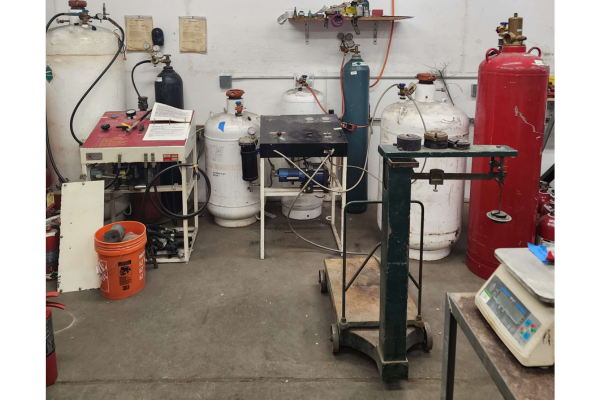Fire safety is not only about having the right equipment and tools, but also making sure that the equipment can work flawlessly when you need it most. Fire extinguisher servicing is no longer just routine maintenance. Instead, it has become a mandatory requirement for all dealers of fire equipment that value safety, reliability and compliance.
If you own a busy storefront or manage the portfolio of clients you serve, understanding the nuances of inspections for fire extinguishers or recharge, as well as tagging is vital to establishing trust and long-term success in this specialized business.
The importance of fire Extinguisher Infrequently, checks are ignored
Every extinguisher on the wall of a commercial structure may appear to be functional, but are they truly functional? Only a fire extinguisher test can confirm this. This involves much more than a quick glance. Certified technicians must examine the pressure levels and the condition of nozzles, seals, tamper indicators, expiration date, and general wear.

Image credit: servicedfireequipment.com
You could leave your customers at risk of fire and fines if you fail to follow these steps. If you work with a professional company which conducts thorough inspections dealers in fire equipment can provide assurance that each item they deliver is in compliance with industry regulations and real-world readiness.
It’s not an option, it’s vital.
A fire extinguisher with a discharge or one which is used only for a fraction of the time is a ticking time bomb. If it’s been accidentally depressed or used for small-scale fires in the kitchen, it could be considered safe only after it has been recharged properly. The importance of a fire extinguisher charge service is obvious.
Recharging involves refilling or replacing the extinguishing agent, repressurizing the cylinder, and making sure the internal components are unharmed. The procedure requires precision and expertise in the different extinguishers (dry chemicals, CO2, foams, etc.). ) and current service equipment.
Many dealers are now outsourcing this job, allowing them to reduce costs while maintaining quality.
What’s the function of fire extinguisher tags in protecting legal rights and customer trust?
The tag may be a minor element, but it makes a huge impact.
Fire extinguisher tagging is the documented proof that a unit has been inspected, maintained, and certified according to state and federal safety codes. The tag includes the following date of service; technician’s ID; the kind of inspection performed and time of next scheduled service. It’s more important than a simple piece of paper for business owners. It offers a layer of protection against responsibility. Dealers consider it badges that show their trustworthiness.
Tags that are not correct or insufficient could result in unsafe inspections failing or fines. They could also lead to a loss of trust from clients. That’s why working with a company that follows accurate and legally compliant tags is vital.
Outsource service, but own the relationship: A smarter business model
For a lot of fire equipment dealers creating relationships and securing sales is where their time should be spent not in maintaining an internal service department. This is why outsourcing the fire extinguisher services including inspection, recharge, and tagging to a specialist provider is becoming the standard model throughout the U.S.
Dealers who take on technical responsibility may expand quickly, and reduce their liability and ensure that the extinguishers sold and lease are able to function when lives and properties are at stake.
Final Thoughts
In the present day, a safety-conscious society Fire extinguisher maintenance is no longer a mere incidental thought. It’s a crucial element of operating success. If dealers place a high value on careful inspection, safe recharge, and legally valid tagging, they aren’t just selling their products. They’re offering confidence, security and peace of thought. In the fire protection industry, that’s the kind of value that will never run out.